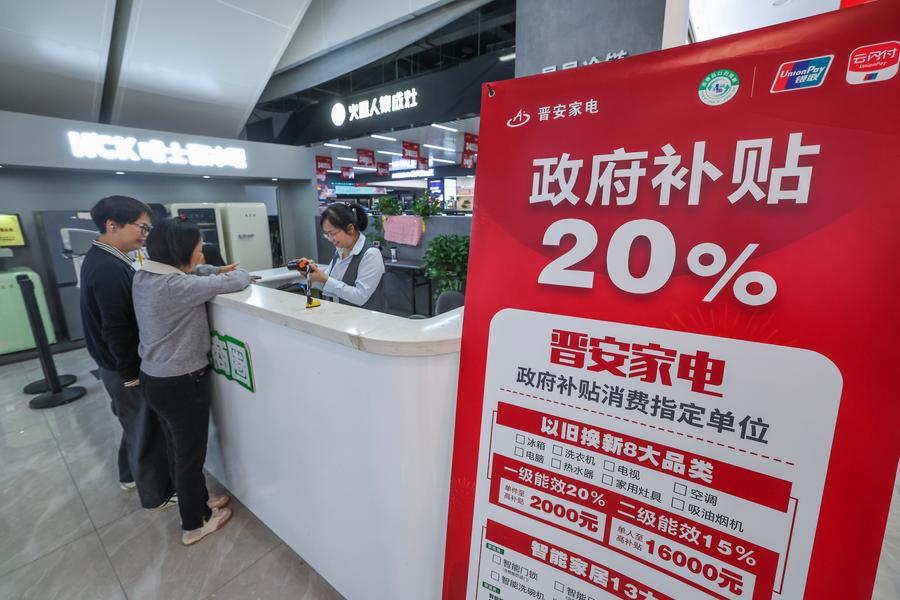




- BRNN
- BRI News
- BRNN News
- Database
Official Documents Polices and Regulations
Inter-government Documents International Cooperation BRI Countries
Business Guide Economic Data BRI Data
Trade
Investment Projects Latest projects
Cases - Content Pool

Customers apply for trade-in subsidy from the government at a cashier in Fuyang, Hangzhou, east China's Zhejiang Province, Oct. 31, 2024. (Xinhua/Xu Yu)
In recent years, there has been a shift in people's consumption needs and concepts, leading to the fading of previous stereotypes about Chinese consumers. Consumption plays a pivotal role in driving economic growth. Given the strong push to boost consumption, it is essential to rediscover Chinese consumers.
Are Chinese consumers "conservative"?
"Conservative" has long been a stereotype associated with the consumption concepts of Chinese people, with a reluctance to try new things. That may not be a fair assessment today.
In the first 11 months of this year, the retail sales of passenger vehicles reached 2.42 million in China, including 1.27 million new energy vehicles (NEVs). The penetration rate of NEVs surpassed that of fuel cars for the fifth consecutive month.
Chinese consumers are eager to embrace new trends. In 2023, the smart home market in China exceeded 710 billion yuan (about $97.66 billion), with over 260 million monthly active users on smart home apps.
Not only are smart devices popular, but digital and information consumption is also growing rapidly. New business models like RV camping, low-altitude flights, and the "terrace economy" are also accelerating. Together this shows Chinese consumers are demonstrating a willingness to try new things.
Do Chinese consumers still prefer foreign products?
In the past, foreign products like dairy products from Australia and small appliances from Japan were highly sought after in China. Today, with traditional culture influencing consumption more, new concepts blending traditional Chinese elements are becoming popular.
The Chinese video game "Black Myth: Wukong" sold over 10 million copies within the first three days of its launch in August. The filming locations, primarily in north China's Shanxi Province, became immensely popular, leading to a significant increase in tourist arrivals and tourism revenue. Furthermore, China's new-style tea drinks and traditional Chinese wedding ceremonies are garnering widespread attention, reflecting the increasing cultural confidence of Chinese consumers.
Are Chinese consumers "closed"?
During the 7th China International Import Expo, Chinese consumers were treated to a variety of exotic foods from around the world, including rice from Thailand, cherries from Chile, kiwifruit from New Zealand, and blueberries from the U.S.
Cross-border e-commerce saw a surge in growth during the "Double 11" shopping festival in November, with e-commerce platforms in Europe, America, Japan, and South Korea offering promotions to provide convenience and savings for consumers worldwide.
Outbound travel is on the rise. During the National Day holiday in early October, 7.59 million entries and exits were made by citizens from the Chinese mainland, an increase of 33.2 percent year on year. Chinese travel agency Ctrip's third-quarter financial report indicated a 120 percent rebound in outbound flight and hotel bookings compared to the same period in 2019.
Openness is a key feature of Chinese modernization. Numerous multinational companies are attracted to invest in China and have developed products that cater to the preferences of Chinese consumers. This year, top executives from companies like Apple, Qualcomm, Mercedes-Benz, and Tesla have visited China, showing their trust in the market and consumers.
Are Chinese consumers introverted?
Reports show that WeChat has over 1.38 billion monthly active users, with nearly 900 million users checking their Moments (a WeChat social networking function that allows users to post images, and texts, etc.) daily. On social media platform Xiaohongshu, there are over 300 million monthly active users, with 70 percent using the search function multiple times a day.
Today, Chinese consumers are recognized for their receptiveness to new trends, confidence in domestic products, open-mindedness, and eagerness to share. The Chinese market is a vast market with top-notch products, and a culture of innovation.
From live-streaming e-commerce to new consumption philosophies like "meme-based consumption" and "self-consumption," these changes reflect new characteristics of Chinese consumers: seeking personalization, diversity, and quality. Not only the youth are keen on self-expression and social recognition, but Chinese senior consumers are also playing an active role, leading new consumption trends.
Today, Chinese consumers need to be reevaluated: they are eager to embrace innovation and provide opportunities for it; they are confident and advocate for domestic products; they have a broad vision, accepting global products; and they are enthusiastic about sharing, promoting good products globally. With a vast market, high quality, and innovative energy, this is the Chinese market!

Tel:86-10-65363107, 86-10-65368220, 86-10-65363106